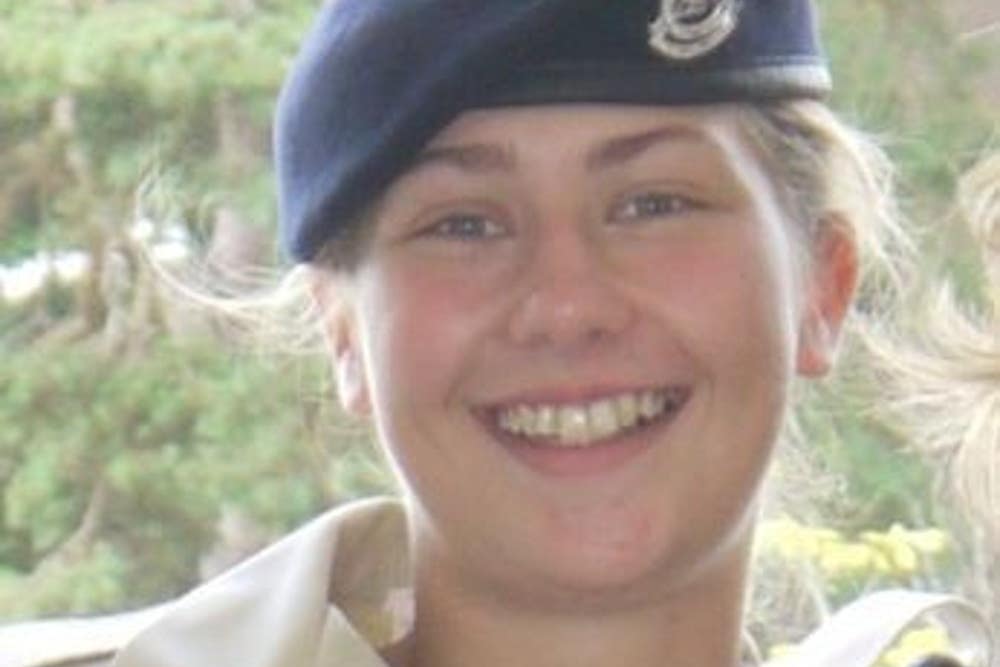Hanged Army officer cadet deemed ‘low risk’ after suicide attempt, inquest hears
Olivia Perks, 21, was discovered dead at the Sandhurst elite military training school in February 2019.

Your support helps us to tell the story
From reproductive rights to climate change to Big Tech, The Independent is on the ground when the story is developing. Whether it's investigating the financials of Elon Musk's pro-Trump PAC or producing our latest documentary, 'The A Word', which shines a light on the American women fighting for reproductive rights, we know how important it is to parse out the facts from the messaging.
At such a critical moment in US history, we need reporters on the ground. Your donation allows us to keep sending journalists to speak to both sides of the story.
The Independent is trusted by Americans across the entire political spectrum. And unlike many other quality news outlets, we choose not to lock Americans out of our reporting and analysis with paywalls. We believe quality journalism should be available to everyone, paid for by those who can afford it.
Your support makes all the difference.The military deemed there to be a “low risk of reoccurrence” when an army officer cadet found hanged in her room made a suicide attempt the previous year, an inquest heard.
Olivia Perks, 21, was discovered dead at the prestigious Sandhurst military academy in Berkshire in February 2019.
An earlier inquest hearing recorded her provisional cause of death as “asphyxia due to hanging”.
Colonel Robert Manuel, president of the service inquiry into her death which reported in November last year, told Berkshire Coroner’s Court in Reading that Ms Perks’ behaviour became erratic on three occasions while drunk.
After the first, where she made a suicide attempt at a Royal Engineers visit in July 2018, she was deemed at low risk of reoccurrence and was later given a “dressing down”.
Following the other two episodes she was not referred for medical help.
Colonel Manuel said: “She wasn’t referred to the medical centre after the third incident. After the Normandy (second) incident there was no referral at that time either to the medical department.”
She was also in a secret relationship with a staff sergeant who worked in the academy’s gym, which was against rules.
Despite engaging in behaviour that appeared concerning, there was a “complete breakdown in welfare support”, the hearing was told.
All Ms Perks had actually done was spend the night in an out of bounds area and missed a parade
Her case was discussed at various meetings but there was “no positive action to support her”.
During the Royal Engineers visit, she confessed that she wanted to go in the sea, wanted to kill herself and asked for a belt and knife.
She also tried to swallow rocks and attempted to strangle herself.
Anna Barclay, whom she was with, became so concerned she began recording Ms Perks as she thought “it was so outlandish that people won’t actually believe it”.
Ms Barclay, who has left the army, added that her friend was allowed to sleep in a room alone and unsupervised just days after the suicide attempt.
She said: “Nobody actually asked me what happened. Everybody seemed to know something had happened but nobody asked me exactly what happened.”
Captain Alexander Clark, who also helped her that night, said he had raised concerns about her being back in training with a priest who provided informal welfare support at Sandhurst, but was told “it was all fine as she had been checked by medical professionals”.
The hearing was told she was at one point asked to “pull herself together”.
Colonel Manuel said medical information was shared with the chain of command but she was deemed to be low risk and “a decision to return her to training was taken.”
He added: “My understanding is that there was a bit of a dressing down. There was a conversation about her behaviour when she was at the Royal Engineers.”
She was on a risk register throughout her time at Sandhurst and her risk was deemed to be amber before being raised to red in the days before her death.
During a trip to Normandy in November 2018 she is said to have inappropriately put her hand on the arm of a colour sergeant.
The hearing was told she “trashed” her room and was hitting her head against a bed frame on the night of the Falklands Ball on February 1 2019.
She had spent the night in a colour sergeant’s room and missed a parade the following morning but neither of them said they engaged in sexual activity.
He was nonetheless dismissed from Sandhurst.
She was just one of several people that night who did things that could have led to disciplinary action, the inquest heard.
When asked whether Ms Perks believed she would be dismissed for being in the colour sergeant’s room Colonel Manuel replied: “Yes, that’s my understanding. All Ms Perks had actually done was spend the night in an out of bounds area and missed a parade.”
Pointing to the celling of the courtroom he said the seriousness with which she treated the incident was “up here” when in reality it was less serious and would not have resulted in dismissal.
The inquest continues.
It will sit for 11 more days between Tuesday and May 26.